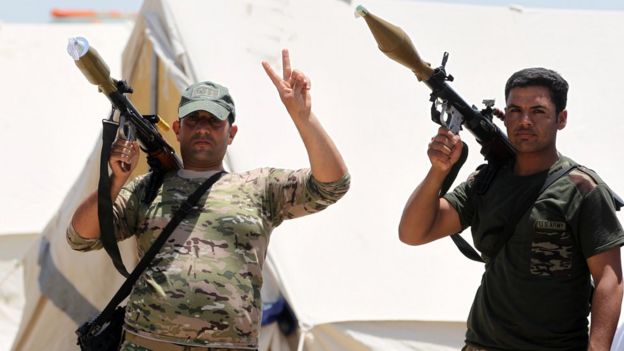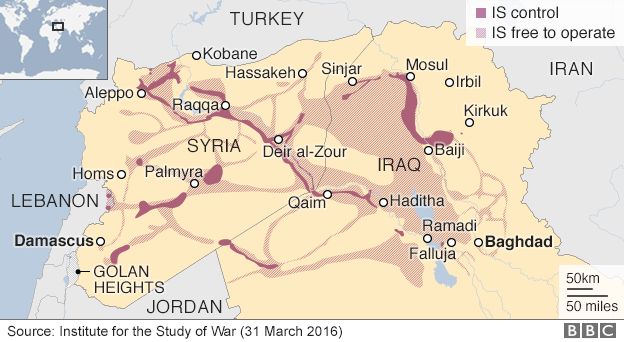
This article is more than
9 year old"Zero hour for the liberation of Falluja has arrived. The moment of great victory has drawn near," hesaid, adding IS had "no choice but to flee".
Both IS and Iraqi media have reported fighting and claimed there are casualties on both sides.
Falluja was the first city to fall to IS in 2014. It also controls Mosul.
The Iraqi government has urged civilians, estimated at between 60,000 and 90,000, to flee.
The Iraqi military told state TV that those who could not leave should raise a white flag above their homes.
Iraqi officials say corridors will be provided for civilians to make their way to camps outside the city.
In the latest fighting, Iraqi TV said IS's "governor" in Falluja, Hejji Hamza, and some of his aides had been killed. Government-backed al-Iraqia TV spoke of more than 30 IS fighters being killed outside the city.
Government forces are reported to have carried out air strikes and mortar attacks overnight.
IS, via its self-styled Amaq news agency, said one of its suicide bombers had destroyed a tank and army bulldozer, killing 16 people.
The military, police and volunteer fighters virtually surround the city, about 65 km (40 miles) west of Baghdad.
The Baghdad-based pro-Kurdish news website Shafaq said on Sunday that close to 20,000 police troops had arrived on the outskirts of Falluja ahead of the expected assault.
Islamic State group: The full story
Islamic State crisis in seven c-harts
 AFP
AFPIS militants launched a sweeping offensive in June 2014, overrunning large areas north and west of Baghdad. However, security forces and allied fighters have pushed the jihadists back with support f-rom US-led air strikes.
Iraq's military seized the nearby city of Ramadi f-rom Islamic State in December.

A former US ambassador to Iraq predicted the Falluja operation would take some time.
"I think Haider al-Abadi has taken the advice of many of his American advisers, which was not to rush into this thing," Christopher Hill told BBC Radio 5 live.
"So they're being very deliberate, very careful, and so I think there's some good reason for optimism that ultimately this will be successful."
The Iraqi army, police and irregular forces virtually surround Falluja and have been heavily reinforced in preparation for an assault on several fronts that military sources say could last two or three weeks.
That may be optimistic, given the many weeks it took earlier this year to take full control of Ramadi, another city further to the west.
Falluja has been held by the militants of IS much longer, for nearly two-and-a-half years, and has withstood a massive battering by government shelling and bombing.
But Iraqi military sources believe the number of militants there has been cut roughly in half and that the battle for Falluja will be a lot less tough than it was for Ramadi.
A former US military adviser in Iraq, Michael Pregent, questioned the wisdom of urging civilians to raise white flags.
"The problem with them [the Iraqi military] saying, 'raise a white flag so we don't shoot you' - IS is going to shoot them when they raise a white flag," he told BBC News.
Should IS lose Falluja, it would leave the northern city of Mosul, Iraq's second-largest city, as its only Iraqi stronghold. It continues to hold large parts of territory in neighbouring Syria, though that too is shrinking.
Last month, the United Nations and Human Rights Watch (HRW) warned civilians still living in Falluja were in danger of starvation.
The UN World Food Programme (WFP) said stocks were dwindling as government forces trying to recapture the city had cut supply routes, and IS had stopped people f-rom leaving.
Some residents were eating grass to survive, HRW said.
One report in Vox.com said that a 110lb (50kg) bag of flour, which costs about $7.50 in the US, had been sold for as much as $4,166 (£2,925; €3,650).